What Has Peta Done For Farm Animals
Several weeks ago, I received this tweet:

<GULP> PETA?!? That is one discussion farmers don't like to hear. It's no clandestine that they are a radical animal-rights extremist group and no friend to farmers. But I decided to do some digging. Who is this David Smalley guy?
Upon my digging I realized we had mutual friends who helped ease my fears. No, David isn't a crazy animal-rights extremist vegan…. just a guy with a popular podcast who talks to people from all walks of life who accept very differing viewpoints on hot topics. The name of the podcast is perfectly fitting: Dogma Debate. Can you lot challenge your dogma? When was the final fourth dimension you inverse your mind from your firmly held beliefs?
David didn't put the pressure on only put the offering out there — "Heed to the episode so determine if you want to come on my show," he said afterward nosotros had a telephone call.
Boy, am I glad I did. Upon listening to the episode where he had a guy from PETA on his show, I took 5 pages worth of notes and left shaking my head at how wrong this guy was. PETA in no way tells the truth of fauna agriculture. They have an calendar — to get people to terminate eating meat and end using animals for annihilation, menses. In my opinion, there'due south goose egg incorrect with someone who chooses that lifestyle, but don't spread lies and fright for fundraising in the procedure.
I agreed to go on the testify, merely it wasn't an easy decision. Beast-rights extremist groups have been known to give death threats to farmers. I've had atrocious experiences with these extremists, as take many other people in my situation. Simply — I thought — if I don't tell the story of animal agriculture on this popular Los Angeles-based podcast, who will?
David packed up his family in his car from LA to our farm in Iowa where they toured our beef and lamb farm and area dairy and squealer farms. It wasn't piece of cake to become farmers to open their barn doors once they see the give-and-take PETA on anything affiliated (understandably so!), only we somewhen made it work one time I eased anybody'due south minds on how David wasn't a threat to us in animal agriculture. They just want to learn more than. One of the pig farms we toured produces 800,000 pigs per year! David and his family had never been to a subcontract before, so I took them from zilch to 100 pretty chop-chop — it was a life changing feel for them. Nosotros had a great time.
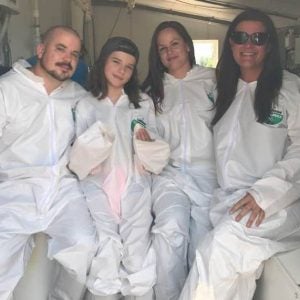
We were greeted on one pig farm past an crawly team of people — the family farmers, upper management, social media and marketing folks, the manure management guys and agronomists, and the veterinary. We were so grateful that they took the time out of their schedule to spend the day with us and teach us all about their role on the farm. We saw everything from where the sows are housed for giving birth, all the mode up to the pigs that are finished for marketplace. This farm has information technology all, with 150 employees and some of the all-time befouled technology around.
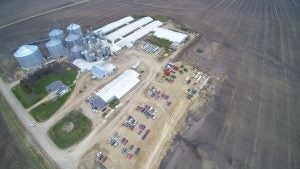
Some of the barns take curtains that automatically go up and down depending on the conditions and temp. Other barns accept a very tech savvy air filtration arrangement that continue the airflow going and clean. There are slats in the floor for their manure to fall through so the pigs are kept clean, healthy, and dry. The manure is stored until its set to be spread on the fields through a several hundred page, very expensive manure management plan regulated past the Department of Natural Resources. 1 affair I noticed was that the odour on the subcontract wasn't that bad at all. Everything is sanitized, including the trucks used for ship. All the pigs have records kept by the vet — vaccine innovation has made it so many pigs are raised with no antibiotics, ever. Biosecurity has reduced risks of disease. Pig care on farms always comes showtime, and these guys actually practise a keen job.
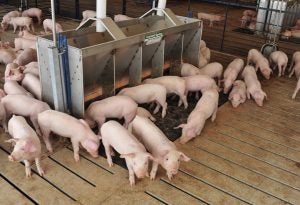
These are the things that organizations like PETA, Mercy for Animals, or HSUS don't want y'all to know. They would like y'all to believe that this is a cruel, "factory" farm where they are raised in torturous conditions. It'south easy to raise sensationalism on a topic that a vast majority of people are far removed from, but what they say near creature agronomics couldn't be further from the truth. They don't take care of these animals for a living — farmers do. And nosotros know what's best.
As I've written about here, 97 per centum of farms are family endemic, and we shouldn't estimate a subcontract past its cover or make assumptions based purely on its size. Large doesn't mean bad when it comes to farming. Farms have advanced; they're bigger than they used to be, sure. But that doesn't mean the farmer'south values have changed. It just means that farmers today are able to do a better job. Years ago when pigs were raised outdoors, they were prone to disease, predators, extreme weather condition temps, ice and snow, frozen waterers, college mortality rates, etc. Not simply that, but back then before manure pits existed and the manure sat exterior, what would happen during a heavy rain? What if the farm sat on a hill? You guessed it: runoff and pollution. All of this can be better managed thanks to applied science. I'm sure smaller farms wish they could beget this crawly engineering, which makes life for the farmer and the animal much better … myself included.
After this nosotros toured a modern gratuitous stall dairy befouled with robotic milkers, automatic manure scrapers, "Fitbit"-type data-driven collars that track about 180 different data points on the cow. The cows also have misters and back scratchers — they even lay in sand! Nutrition plans are advisedly selected on all farms, to ensure the best diet for breeding or growing, depending on the animal and what's going on with them.
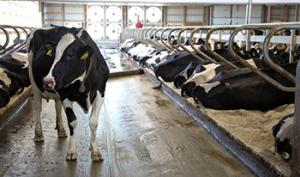
We then finished off doing the podcast on our farm, where nosotros also did a 360-degree video from i of our cattle pens. I highly recommend you guys heed to this podcast. It's kind of long, simply we comprehend all the hot topics in agriculture, and it's very informational and fun! Merging the subcontract life with the city life is something I'm really passionate about, and I hope it shows. Savor!
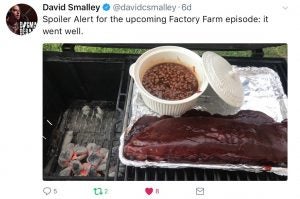
Michelle Miller, the Subcontract Infant, is an Iowa-based farmer, public speaker and writer, who lives and works with her young man on their subcontract which consists of row crops, beef cattle, and sheep. She believes educational activity is cardinal in bridging the gap betwixt farmers and consumers.
Sponsored Content on AGDaily
Source: https://www.agdaily.com/insights/farm-babe-farmer-stands-peta/
Posted by: coxyourock.blogspot.com

0 Response to "What Has Peta Done For Farm Animals"
Post a Comment